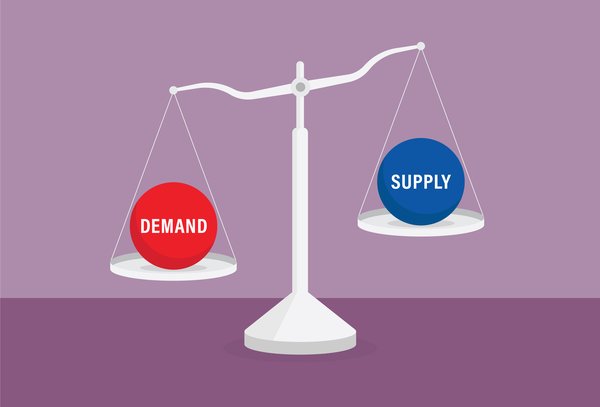Cryptocurrency investors were on edge when 2022 rolled in. The price of the leading token Bitcoin (CRYPTO:BTC) was up 61%, and Ethereum (CRYPTO:ETH) had climbed 409% over the previous year. But the last massive surge in 2017 was followed by an ice bath in 2018, and the leading coins started to trend downward in November 2021. Was the crypto market headed for another sharp correction?
As it turns out, the mostly positive market momentum of 2021 was overwhelmed by bearish trends in the spring of 2022. The stock market dipped due to surging inflation, Russia's invasion of Ukraine, and other macroeconomic challenges. Cryptocurrencies followed suit, falling back much faster than the S&P 500 in this period.
The 2023 calendar may answer some important questions that were left unanswered in previous years, setting the course for cryptocurrencies and their investors for the long run. Here's what to expect.

Crypto market predictions for 2023
It's impossible to say exactly what will happen to the cryptocurrency market in 2023 and beyond. There are still more questions than answers. But by keeping an eye on a few overarching themes of crypto, you will be able to make better investing decisions as the market continues to evolve.
You should pay particularly close attention to a handful of crucial details:
- Regulation in the U.S. and abroad.
- Mass-market adoption of cryptocurrency payments.
- Exchange-traded funds based on Bitcoin and other digital currencies.
- Countries adopting Bitcoin (or other digital currencies) as legal tender.
As these issues develop and are resolved, the long-term future of the cryptocurrency sector will take shape. The picture may start to crystallize by the end of 2022 as governments and blockchain developers hammer away at their long-term crypto plans.
Even so, a series of baby steps that started with Bitcoin's creation in 2009 are likely to continue for many more years.
Why cryptocurrency could be the future of money
In one best-case scenario for 2023 and beyond, regulators around the world might come together on a global framework for crypto regulation. However, that looks unlikely today since international views of crypto range from, "Bitcoin is an official currency," in El Salvador and the Central African Republic to, "Crypto transactions are illegal," in China. Global unity on the issue seems unlikely in the short term.
Crypto regulations are moving forward on a federal level, though. The Biden administration has put together a highly qualified team to steer the cryptocurrency regulation process led by U.S. Treasury Secretary Janet Yellen and Gary Gensler, chairman of the Securities and Exchange Commission. Yellen has been tracking the sector for years, although sometimes taking a skeptical view. Gensler taught classes on Bitcoin, blockchains, and other cryptocurrency topics at the Massachusetts Institute of Technology in 2018.
With highly knowledgeable people setting the tone for future regulations, there's hope that a workable system can be developed for investors, consumers, cryptocurrency businesses, and traditional banks. Informed regulators will understand crucial and meaningful issues such as the differences between a value storage system such as Bitcoin and a sophisticated ledger with smart contracts such as Ethereum. Congress introduced a few crypto regulation bills in the first half of 2022, but the wheels of bureaucracy move slowly, and this issue deserves some deep thinking and careful analysis.
As government entities work out a legal framework and taxation system, cryptocurrencies could find their way into the digital wallets of U.S. consumers on a large scale. But even though Bitcoin became legal tender in El Salvador in 2021 and the Central African Republic in 2022, the U.S. isn't likely to follow suit anytime soon.
However, many retailers are likely to start accepting payment in cash-like digital currencies such as Bitcoin, Litecoin (CRYPTO:LTC), or the clone of a clone of Bitcoin known as Dogecoin (CRYPTO:DOGE). Increased use of crypto should spur regulatory agencies and politicians to take faster action, and the blockchain systems should also benefit from widespread usage.
The processes will percolate through the crypto market over the next few years. Investors can't stand uncertainty, so even an overly strict regulatory framework is likely to be an improvement over today's ramshackle oversight.
Why cryptocurrency may not be the future of money
A brighter future could be delayed in several ways:
- Policymakers may drag their feet and fail to reach a sensible regulatory framework in the next couple of years.
- They could decide that currencies such as Bitcoin and Litecoin only serve illegal activities and bad actors, and that none of that activity belongs on U.S. soil.
- Retailers might balk at the unpredictable value of digital currencies and insist on traditional cash or credit card transactions instead.
- A sudden rash of security breaches, failing technology platforms, and other threats to the security of blockchain-based payment systems could undermine public trust in digital currencies. For example, algorithmic stablecoins got a bad rap after the collapse of TerraUSD (CRYPTO:USDT) in April 2022.
Under any combination of these circumstances, the digital currency revolution could be delayed by several years. And, assuming it finally does arrive, it might look very different from the Bitcoin-led sea change that surged in 2021. In the very long run, it seems unlikely that any government or group of nations will stop the cryptocurrency idea entirely, but they can slow down the movement and steer the final product in various directions.
These risks might sound hypothetical, but they are very real. In the end, the cryptocurrency community must get along with regulators around the world. Failing to do so could throw massive roadblocks in front of the digital currency sector's progress.
That's why you shouldn't bet the farm on Bitcoin, Ethereum, or crypto in general. This market tends to move in mysterious and unpredictable ways, skyrocketing one year and crashing down in the next. Informed investors want to build a diversified portfolio for the long run that is able to withstand dramatic setbacks in any particular sector.

























































































































